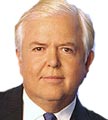
Lou Dobbs
Looking for a silver lining
http://www.jewishworldreview.com | This past week was one of high anxiety, dampened spirits and lower stock prices. War against Saddam Hussein seems to be just a matter of time. The North Korean nuclear crisis shows no sign of resolution. And the government is telling us that the threat of a terrorist attack against Americans is heightened.
In fact, we may be facing the most dangerous environment the world has known, Secretary of Defense Donald Rumsfeld recently told Congress.
It's an environment that:
- Has prompted investors to sell stocks, pushing the major stock indexes to four-month lows.
- Is marked by $36-a-barrel oil and the lowest yields on two-year government notes since they were first issued regularly in 1972.
- Has caused many market analysts to ratchet down their outlook for both stocks and economic growth.
The Bush administration and the Democrats are at odds over tax cuts and spending. The Bush administration is at odds with France and Germany over Iraq. And last week, it became evident that the Bush administration and Federal Reserve Chairman Alan Greenspan are at odds over budget deficits.
President Bush is pushing his tax cut plan, but Greenspan says further stimulus isn't needed, because the economy will likely strengthen after the conflict with Iraq has ended. However, Greenspan's comments are cold comfort to businesses afraid to boost spending until the conflict is resolved. And stronger capital spending, we now know, is the key to speeding up this atypical recovery.
On top of it all, corporate fraud is back in the news in a big way.
The House-Senate Joint Committee on Taxation released a new report on the Enron fiasco, which Senate Finance Committee Chairman Charles Grassley called "the biggest corporate farce of the century."
Among the report's findings: Enron used financial shell games and tax shelters to generate $2 billion in artificial tax benefits, and the company paid its top 200 employees $1.4 billion in 2000 through stock options and salaries - more than the company's net earnings for all of that year.
The report is a sickening reminder of the outrageous abuses committed by some corporations during the height of the boom. And it's a wake-up call to regulators and legislators that much more needs to be done to prevent further outbreaks of fraud. Meanwhile, it's been 16 months since the corporate corruption scandal broke, and not a single executive is in prison.
It's hard to recall a more troubling time for the markets in modern memory. We have to look back to the early 1970s to find the closest parallel. At that time, the country faced the first OPEC oil embargo, the Yom Kippur War, Watergate and the final years of the Vietnam War. Jeff Hirsch of the Stock Trader's Almanac points out that the Dow bounced between 500 and 1000 for 12 years - essentially a sizable, but sideways trading range. Hirsch expects the same for stocks this time around.
While Hirsch agrees with the conventional wisdom that decisive action on Iraq will likely provide a temporary boost to the market, he thinks there are "plenty of other things" to keep stocks range-bound for some time.
"The hangover from the bubble is still there, and valuations are still going to be questioned," Hirsch said.
Harvey Pitt told me this past week in his final interview as Chairman of the Securities and Exchange Commission, "It's now clear that it's so easy to lose confidence in an instant. It takes quite a long time to build it back."
We were talking about corporate corruption and Wall Street reform. But Pitt's words could have also applied to Iraq, North Korea, Al-Qaida or any other of the numerous challenges now facing this country.
Enjoy this writer's work? Why not sign-up for the daily JWR update. It's free. Just click here.
Lou Dobbs is the anchor and managing editor of CNN's "Lou Dobbs Moneyline." Comment by clicking here.
02/10/03: Space program remains a valuable investment
02/04/03: Hi pal, come back
01/28/03: Bush address a chance to bolster confidence
01/22/03: Here we go again!
01/14/03: Bush's bold bid
01/07/03: The only thing certain is uncertainty
12/30/02: No need to be so negative as new year approaches
12/23/02: NY's AG deserves credit for settlement
12/18/02: Critics of Bush nominees should tone down rhetoric
12/09/02: A lot rides on prez's Treasury pick
12/04/02: A fast fix for corporate credibility?
11/26/02: Urge to merge is hard to resist
11/19/02: Are we really so bad off?
11/12/02: Bush's lucky week bodes well for recovery
11/05/02: Wall Street firms treat investors as fools
10/29/02: Earnings estimates offer some hope
10/22/02: Economy's strength tied to national security
10/17/02: Harvey Pitt, get real!
10/08/02:Are we experiencing the fall before the rise?
10/01/02: Concerns about earnings are justified
09/24/02: Business leaders must abandon stall tactics
09/17/02: Wall Street's reality check
09/12/02:
There's no better time for leaders to show resolve

